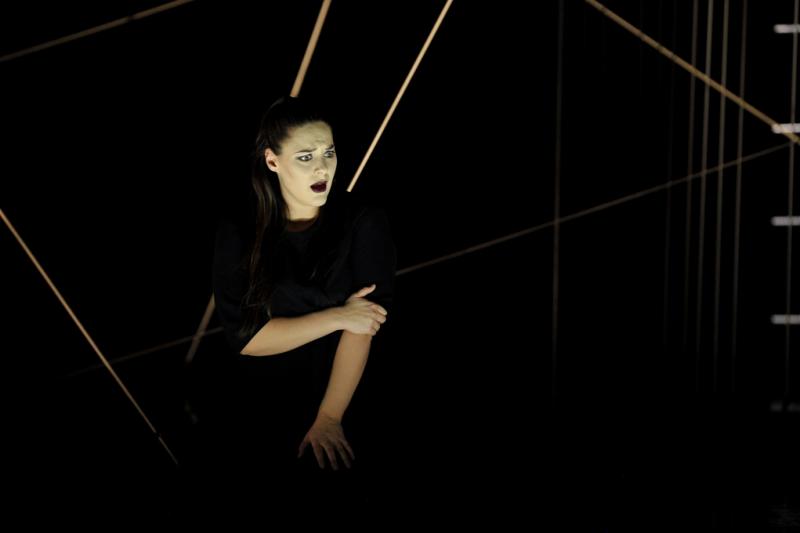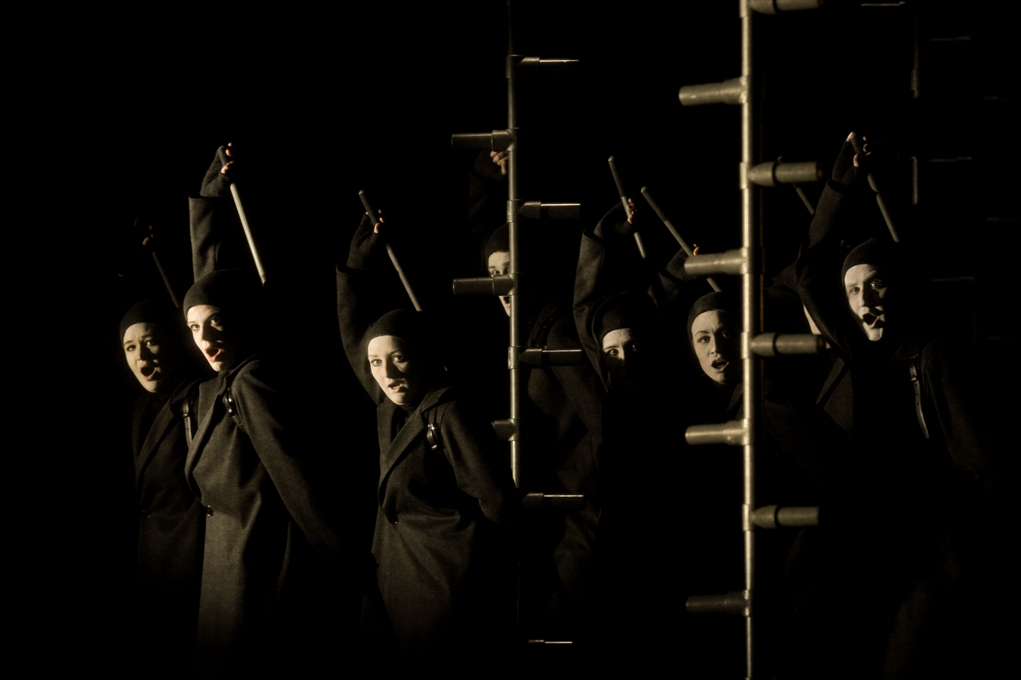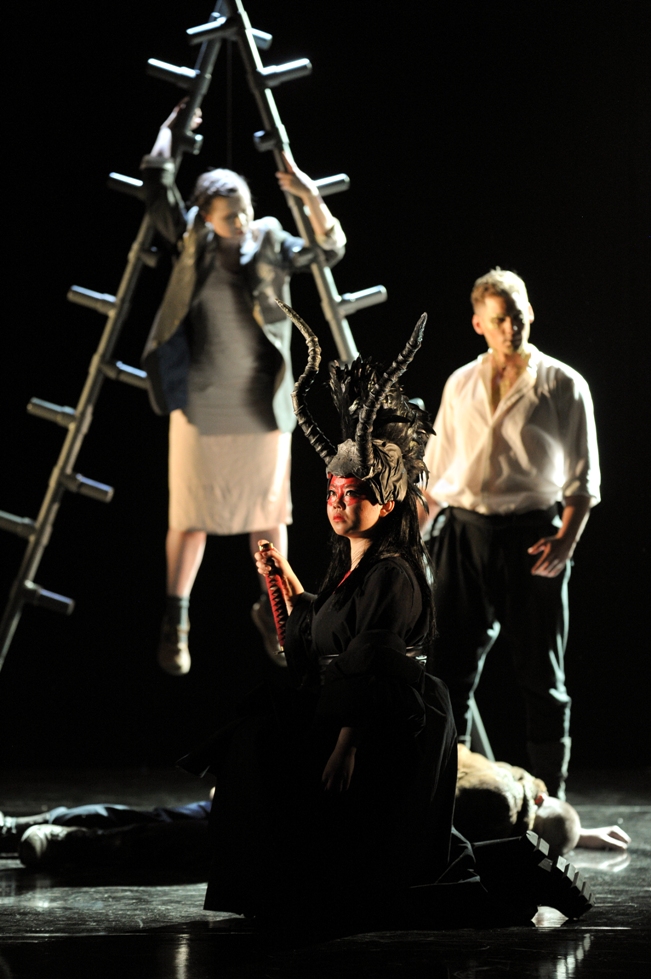Giove in Argo, Britten Theatre, Royal College of Music | reviews, news & interviews
Giove in Argo, Britten Theatre, Royal College of Music
Giove in Argo, Britten Theatre, Royal College of Music
Into the woods with quality Handel, fine young singers and the brilliant Laurence Cummings

If you’re looking for rare festival Handel, better a pasticcio – take that as shorthand for a cut-and-paste job mostly from previous hits – than one of those original operas in which the composer only goes through the motions (and I’ve heard a few).
Which this sextet from the RCM International Opera School plus chorus certainly were on the first occasion where I’ve been to a production with students in the leads and never once thought, "What did their teachers think they were up to?" What’s more, I saw the second-night cast – which certainly doesn’t mean the B team. That these superb singers were so confident and physically animated surely had much to do with Cummings’ ever-buoyant support conducting a razor-sharp London Handel Orchestra and with a director, James Bonas, who knew what he was doing.
In this first UK performance since the 1739 premiere, we got not the advertised pretty pastoral of nymphs and shepherds in sylvan glades, into which Jupiter descends and pursues two of his amours with no prospect of the usual metamorphoses, but a very dark forest of climbing-post trees in which crazy, mixed-up characters arrived to be messed with still further. Well, that’s one up for a start on Glyndebourne’s misconceived staging of Mozart’s La finta giardiniera, where the wild wood became a crumbling palatial room and the plot incomprehensible.
 There’s not, as often in Handel, much to this one, though the outcomes before the presumed happy ending see one of Jupiter’s loves, Iside – very loosely based on Io – go mad and the other, Calisto, await execution for betraying goddess Diana’s rules. That’s enough for Bonas to contravene the programme observation of Handel scholar John H Roberts, who reconstructed the opera and provided the music for the text of the secco recitatives, that “nothing is supposed to be taken very seriously”. Iside’s path to madness includes some vicious physical abuse from her fiancé Osiri and reconciliation isn’t for her at the end (does the shower of gold, though, hint at Jupiter’s next love, Danae?). Early on, there are some witty touches, like Iside’s enchantment by the forest-stalking Giove and the way he levitates her for seduction (a wry homage, perhaps, to the suspensions of Peter Brook’s classic A Midsummer Night’s Dream).
There’s not, as often in Handel, much to this one, though the outcomes before the presumed happy ending see one of Jupiter’s loves, Iside – very loosely based on Io – go mad and the other, Calisto, await execution for betraying goddess Diana’s rules. That’s enough for Bonas to contravene the programme observation of Handel scholar John H Roberts, who reconstructed the opera and provided the music for the text of the secco recitatives, that “nothing is supposed to be taken very seriously”. Iside’s path to madness includes some vicious physical abuse from her fiancé Osiri and reconciliation isn’t for her at the end (does the shower of gold, though, hint at Jupiter’s next love, Danae?). Early on, there are some witty touches, like Iside’s enchantment by the forest-stalking Giove and the way he levitates her for seduction (a wry homage, perhaps, to the suspensions of Peter Brook’s classic A Midsummer Night’s Dream).
It’s clear from the start that everyone will have a huge amount of stylized business to remember as they sing, starting with a hard-working chorus (pictured above) which takes a while to warm to its task but eventually produces one of the evening’s greatest pleasures, the gorgeous polyphonic number derived from a cantata trio which ends the second act, delivered from different points around the auditorium as a manifestation of Iside’s insanity.
 The business with Diana putting on her massive, antelope-horned headdress didn’t quite work (and her lanterns were a bit crumpled-looking, too): He Wu (pictured left with Galina Averina's Calisto and Gyula Rab's Giove) seemed nervous about it to start with, but went on to deliver several showpieces with steely aplomb and ringing top notes. Those latter seemed the only items lacking in Hungarian tenor Gyula Rab’s armoury as Giove, but there’s time to work on them. He has perfect lyric-tenor style and feline sex appeal in his physicality which, as Bonas obviously intended, allied him more to a mixture of Oberon and Puck than to the Graeco-Roman god. Brute testosterone came from the Erasto/Osiri of Timothy Nelson, a baritone to watch.
The business with Diana putting on her massive, antelope-horned headdress didn’t quite work (and her lanterns were a bit crumpled-looking, too): He Wu (pictured left with Galina Averina's Calisto and Gyula Rab's Giove) seemed nervous about it to start with, but went on to deliver several showpieces with steely aplomb and ringing top notes. Those latter seemed the only items lacking in Hungarian tenor Gyula Rab’s armoury as Giove, but there’s time to work on them. He has perfect lyric-tenor style and feline sex appeal in his physicality which, as Bonas obviously intended, allied him more to a mixture of Oberon and Puck than to the Graeco-Roman god. Brute testosterone came from the Erasto/Osiri of Timothy Nelson, a baritone to watch.
Two excellent leading ladies appeared in close succession. No doubt about it, Kezia Bienek had star quality from the start, a disciplined stage animal with a finely-controlled metal about the voice which marked her out not so much as the advertised mezzo – though she certainly has the lower register – but as a potential ideal for Mozart’s Elettra and Donna Anna (invocation of furies and grief over a dead father simply underlined the resemblances). Indeed, one of the few new pieces of writing for the premiere, a magnificent recitativo accompagnato for Iside’s first mad scene, comes closer to Mozart than anything else I’ve heard in Handel. Bienek, Cummings and the orchestra between them also persuaded us that the two interpolated arias by one Francesco Araja were well up to the mark of Handel in full spate.
Galina Averina’s Calisto was going to take time to emerge from Bienek’s shadow, but Handel gives his nymph two proven showstoppers – Alcina’s “Tornami a vagheggiar” and “Combattuta da piu venti” from Faramondo – and Avernina sang both with true Handelian-soprano panache. Much depends in the faster numbers on the perfect mood set by orchestra and conductor, and though Giove in Argo contains no fancy instrumentation, the strings proved endlessly resourceful and varied. Even my worry that only one double-bass isn’t enough to make Handel rock vanished as Pippa Macmillan provided the percussion as well as the heft. This is what the operatic Handel is all about: endless pleasure, lashings of energy and a touch of pathos. In every respect, this team did him proud. It’s so good that you could go twice – once for each cast
rating
Explore topics
Share this article
Add comment
The future of Arts Journalism
You can stop theartsdesk.com closing!
We urgently need financing to survive. Our fundraising drive has thus far raised £49,000 but we need to reach £100,000 or we will be forced to close. Please contribute here: https://gofund.me/c3f6033d
And if you can forward this information to anyone who might assist, we’d be grateful.

Subscribe to theartsdesk.com
Thank you for continuing to read our work on theartsdesk.com. For unlimited access to every article in its entirety, including our archive of more than 15,000 pieces, we're asking for £5 per month or £40 per year. We feel it's a very good deal, and hope you do too.
To take a subscription now simply click here.
And if you're looking for that extra gift for a friend or family member, why not treat them to a theartsdesk.com gift subscription?
more Opera
 Orpheus and Eurydice, Opera Queensland/SCO, Edinburgh International Festival 2025 review - dazzling, but distracting
Eye-popping acrobatics don’t always assist in Gluck’s quest for operatic truth
Orpheus and Eurydice, Opera Queensland/SCO, Edinburgh International Festival 2025 review - dazzling, but distracting
Eye-popping acrobatics don’t always assist in Gluck’s quest for operatic truth
 MARS, Irish National Opera review - silly space oddity with fun stretches
Cast, orchestra and production give Jennifer Walshe’s bold collage their all
MARS, Irish National Opera review - silly space oddity with fun stretches
Cast, orchestra and production give Jennifer Walshe’s bold collage their all
 Káťa Kabanová, Glyndebourne review - emotional concentration in a salle modulable
Janáček superbly done through or in spite of the symbolism
Káťa Kabanová, Glyndebourne review - emotional concentration in a salle modulable
Janáček superbly done through or in spite of the symbolism
 Buxton International Festival 2025 review - a lavish offering of smaller-scale work
Allison Cook stands out in a fascinating integrated double bill of Bernstein and Poulenc
Buxton International Festival 2025 review - a lavish offering of smaller-scale work
Allison Cook stands out in a fascinating integrated double bill of Bernstein and Poulenc
 Tosca, Clonter Opera review - beauty and integrity in miniature
Happy surprises and a convincing interpretation of Puccini for today
Tosca, Clonter Opera review - beauty and integrity in miniature
Happy surprises and a convincing interpretation of Puccini for today
 Hamlet, Buxton International Festival review - how to re-imagine re-imagined Shakespeare
Music comes first in very 19th century, very Romantic, very French operatic creation
Hamlet, Buxton International Festival review - how to re-imagine re-imagined Shakespeare
Music comes first in very 19th century, very Romantic, very French operatic creation
 Falstaff, Glyndebourne review - knockabout and nostalgia in postwar Windsor
A fat knight to remember, and snappy stagecraft, overcome some tedious waits
Falstaff, Glyndebourne review - knockabout and nostalgia in postwar Windsor
A fat knight to remember, and snappy stagecraft, overcome some tedious waits
 Salome, LSO, Pappano, Barbican review - a partnership in a million
Asmik Grigorian is vocal perfection in league with a great conductor and orchestra
Salome, LSO, Pappano, Barbican review - a partnership in a million
Asmik Grigorian is vocal perfection in league with a great conductor and orchestra
 Semele, Royal Opera review - unholy smoke
Style comes and goes in a justifiably dark treatment of Handelian myth
Semele, Royal Opera review - unholy smoke
Style comes and goes in a justifiably dark treatment of Handelian myth
 Le nozze di Figaro, Glyndebourne review - perceptive humanity in period setting
Mostly glorious cast, sharp ideas, fussy conducting
Le nozze di Figaro, Glyndebourne review - perceptive humanity in period setting
Mostly glorious cast, sharp ideas, fussy conducting
 Fidelio, Garsington Opera review - a battle of sunshine and shadows
Intimacy yields to spectacle as Beethoven's light of freedom triumphs
Fidelio, Garsington Opera review - a battle of sunshine and shadows
Intimacy yields to spectacle as Beethoven's light of freedom triumphs
 Dangerous Matter, RNCM, Manchester review - opera meets science in an 18th century tale
Big doses of history and didaction are injected into 50 minutes of music theatre
Dangerous Matter, RNCM, Manchester review - opera meets science in an 18th century tale
Big doses of history and didaction are injected into 50 minutes of music theatre

Comments
Just to let you know, it was
Thanks, corrected.
Thanks, corrected.